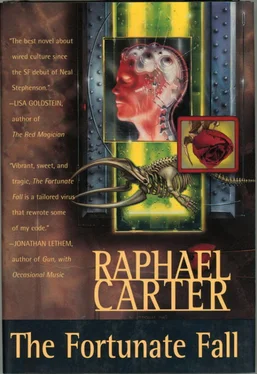“I guess that’s true. Won’t they be able to trace this car, though?”
“Not a chance. The license plate’s a hologram, which I’m changing at random intervals. The color cycles through the full spectrum, too gradually to notice. And on top of that, I used the onboard computer to give every car in Leningrad the same registration number. Everything but the kitchen sink in these babies.”
“How’d you steal it? Don’t they have alarms?”
“I signed it out to Officer Pudding. One of our pal Voskresenye’s back doors.”
“How many back doors are there in the Postcop computers?”
“Uh, before or after today? I think I’ve used up about half of them.”
“Terrific,” I said. The adrenaline high of finding myself free was beginning to wear off. I tried to look out the side window, only to find that there wasn’t one. “Where are we going?”
“Arkhangelsk, of course. You’ve got an interview to do.”
“But I don’t even have a camera chip!”
“Check the glove box,” she said smugly.
“I don’t think I can….”
“Oh, right.” A segment of the dashboard slid aside, revealing the rosebox I had left under the bathroom sink.
“How did you get this here if you’re still in Arkhangelsk?”
“I, um…” She looked at me, then turned away and said meekly, “I sort of hired someone to break into your house.”
I looked at her in anger, but immediately relented. “I guess it doesn’t matter now.”
“That’s the spirit.”
“Look,” I said, “moistware or no moistware, I’m never going to get on the air. The first thing the Postcops’ll do when they figure out what happened is to call Netcast and have my time slot revoked.”
“Yeah, they already did that.”
I sighed in frustration. “Then why are we going to Arkhangelsk?”
“Wanna hear my impression of a Net executive?”
I stared at the side of the road, having figured out how to pan the vehicle’s cameras. “I’m not going to get out of this, am I? Sooner or later we’ll run out of back doors and luck. At the outside, maybe I’ll manage to do the Netcast and die famous. But probably not even that. Chances are I’ll never even get to meet you.”
“But the Netcast changes everything,” she said earnestly. “The world will be following your every move. You’re going to have a lot of people watching over you.”
“You mean I’ll be surfed.”
She nodded sadly. “I’m afraid so.”
I shook my head a little, which made the helmet tug uncomfortably against my sockets. “I’m not sure which is worse—dying, or having every prepubescent in Russia trying to get behind my eyes.”
“But it’s only for a little while. Before all this happened I was going to build you a shield, but instead I’m going to take out the defenses you already have. The Postcops won’t come for you when you’ve got a thousand people in your head. It’s not in their programming.”
“They’ll find a way,” I said.
“Eventually. But by that time, I’ll have you in Africa.”
I laughed without humor. “You better get that screening chip checked out. You’re not getting good color fidelity.”
“It doesn’t matter how white you are, you can still get political asylum. You know how His-Majesty-In-Chains feels about suppressor chips. Your encyclopedia is as good as a passport.”
“But I’d have to get across the border first.”
“That’s what I’m working on now,” she said. “But I’ll find a way.”
“I wish I could believe you.”
“We will meet, Maya. I’m not letting you off that easy.”
I watched the road in silence. At last she said, “Maya, I’d rather stay with you, but I’m still working on the Postcop computers, and I need to make plans to get you into Africa, too. I just don’t have the bandwidth to spare. Can you drive for a while?”
“I can’t drive a car like this.”
“There’s nothing to learn. It’s a direct neural interface. Here, take it.”
“But—” And then I was the car. It was as if I had been born with wheels, as if evolution had crafted my nerves to fit axles and gears instead of muscles and bones. I felt the wind against my skin. The road beneath me was an ever-changing stream of tastes and textures, to which my tires responded with a constant rearrangement of their fingerprints.
“Are you all right?” she asked anxiously.
“All right doesn’t begin to cover it,” I answered from the dashboard speaker. I adjusted my shape to reduce drag, and shot forth even faster, trying to see if I could reach 400 kph. After a few minutes, I could barely remember what it was like to have a human body. Even the vague sensations from my internal organs had been changed: my stomach was an engine. And I realized as I felt its heat that the car was not electric, but internal combustion. It burned. Other cars were barely even obstacles; there was nothing on the road but me—looking just like any other car, yet harboring this secret fire.
“Uh-oh,” Keishi broke in. “We’ve got a Postcop, dead ahead.”
“Just one? What is he?”
“Standard wasp. Not a threat in itself, but if a Weaver notices—”
“I see him now,” I said. “I don’t think it’s going to be a problem.” I accelerated toward him, the indicator trembling just below the 400 mark. The wasp came into view, crawling toward me at a pathetic pace, his whining little sirens on. I made myself the color of the road and leapt at him, an invisible bullet. When I reached him I breathed static into his ears and spat needles. His tires were shredded and he spun out of control into my lane. I was not afraid: I had seen the motion before it began. I slid past, stretching out an arm to scoop the air against him. He was blown onto the shoulder of the road. I swerved, braked, and farted fire. As I accelerated again I saw the wasp engulfed in brick-red flames. I didn’t look at it for long.
“You did it,” Keishi said. “I didn’t get a peep of radio.”
“Too bad,” I said. “I switched our registrations as we passed him. If he had called home, they’d have come and finished off the job.”
She chuckled appreciatively. “I always knew you had potential.”
“Always?” I said. “How long is always? Last week? It seems like forever.”
“Yes, it does,” she said softly. “It seems like twenty years.” She broke contact. I accelerated back up to 350. Then I extruded ailerons, making the car skip over the road like a stone on water. I adjusted, and began to glide, as over ice. The indicator shuddered past 350, and didn’t stop: 360, 370. There was no use fighting it. I had fallen into hope, as you might fall into the ocean; and though I knew I would drown eventually, for the moment it seemed as though the deep, deep sea would keep me up.
Almost… yes: 400. My tires brushed the road only rarely, as if to assure themselves it was still there. Is love like this? I wondered, as I leapt into the air again. “Better,” was the whispered answer. Like this? I asked, as I rippled my skin to fling the wind away from it. “Better,” as my fingertips tasted the road.
Then I had a thought that seized my brakes with fear and sent me spinning across the road. I could barely control the skid enough to bring us safely to a stop.
“What are you doing? We haven’t got time!”
“Keishi,” I said, “if I go to Africa, what happens to you? They won’t let you immigrate.”
“I can take care of myself. Drive!”
“That’s not an answer.” Silence. “And I’m not going anywhere until I get one.”
“Well,” she said at length, “it is Africa.”
“What the hell is that supposed to mean?”
Читать дальше












